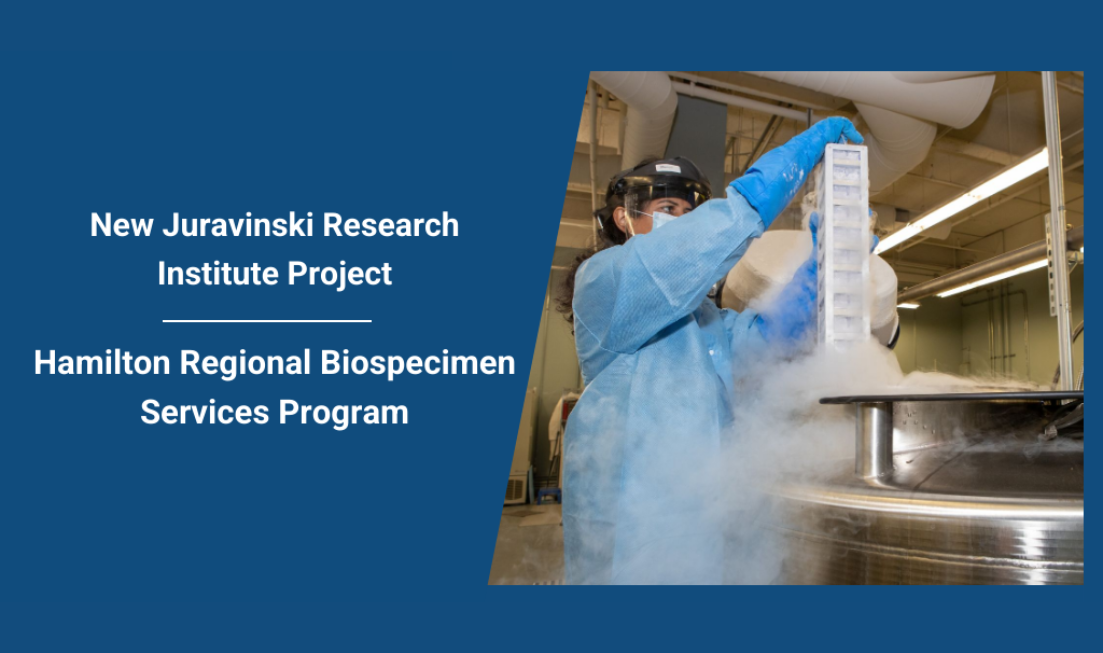Juravinski Research Institute announces new Hamilton biospecimen program to propel medical discoveries

Funding from the Juravinski Research Institute has established the Hamilton Regional Biospecimen Services Program to better collect and manage biological samples for research.
February 20, 2025
Hamilton is about to make big strides in health research with the launch of the Hamilton Regional Biospecimen Services program (HRBS).
This initiative is made possible with funding from the Juravinski Research Institute (JRI), a collaborative effort between Hamilton Health Sciences, McMaster University and St. Joseph’s Healthcare Hamilton.
Biobanks are like libraries for biological samples such as blood or tissue. They play a critical role in medical research by providing researchers with access to samples used to study various diseases and by helping scientists make discoveries and improve treatments that will help people live healthier lives.
The HRBS will bring together and simplify how most biobanks work across Hamilton Health Sciences, McMaster University and St. Joseph’s Healthcare Hamilton. It will create a single, organized system for collecting, storing and sharing biological samples, recruiting donors, getting consent, gathering clinical data and analyzing samples.
“The HRBS prioritizes impact on patient care while advancing scientific discovery,” said Lehana Thabane, chair of the JRI scientific committee and vice-president of research at St. Joseph’s Healthcare Hamilton.
“Patients will have more opportunities to donate samples for cutting-edge research, and researchers will have the tools, resources and collaborations needed to publish groundbreaking studies, commercialize discoveries and develop new health solutions.”
Once fully operational, the HRBS will act as a one-stop shop for researchers, using the skills and resources of partner institutions to make the process simple and efficient. Some of the potential benefits of the HRBS include:
- A centralized database: The project will create and manage a centralized specimen database, providing an easy-to-use online portal for researchers to access all services.
- Support for diverse research needs: HRBS will coordinate access to various biospecimen-related services, such as analyzing and testing samples.
- Patient-centric approach: The burden on patients will be minimized by reducing the need for multiple biospecimen donations and ensuring collected samples are used to their maximum potential.
This collaborative initiative is led by Guillaume Paré from the Population Health Research Institute and Thrombosis and Atherosclerosis Research Institute at McMaster University; Sheila Singh from the Centre for Discovery in Cancer Research at McMaster University; and Gino Celebre from the Research Institute of St. Joe’s Hamilton.
Hospital and university staff are encouraged to contact Paré, Singh, and/or Celebre to learn more about using the service.
As a newly funded project, the HRBS will be implemented in phases, starting with pilot projects and scaling up to manage all aspects of its operations effectively.
The JRI is improving the health of Canadians by advancing groundbreaking research at Hamilton Health Sciences, McMaster University and St. Joseph’s Healthcare Hamilton. The institute and its projects are funded through the generosity of the late Hamilton philanthropists, Charles and Margaret Juravinski, and the Juravinski Foundation. Join Charles and Margaret in making a lasting legacy to pioneering health research by making a gift in support of the JRI.


